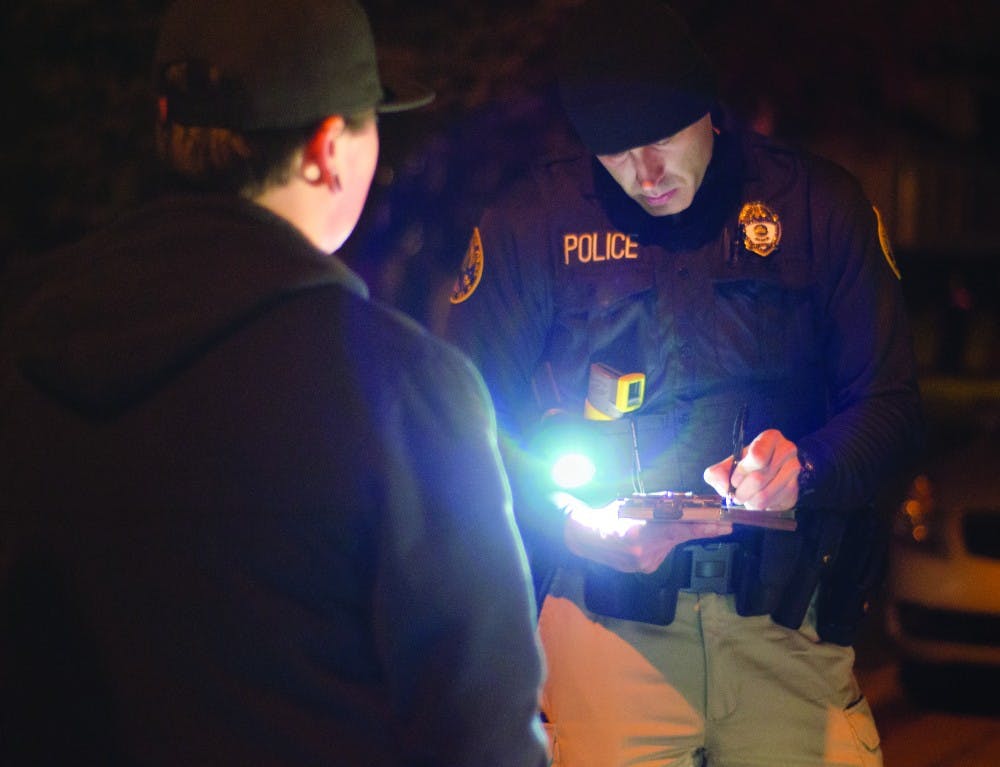EDITOR’S NOTE: Jessica Johnson and Jake Brown are pseudonyms for students who wish to remain anonymous.
A good attitude goes a long way when confronting police, especially when they decide whether someone will receive a ticket instead of a ride to jail.
Brandon Thomas, an Indiana Excise Officer, said the last thing a person should do is run from police when they hear sirens or see lights.
“Just don’t walk away,” Thomas said. “Running into your house doesn’t help you.”
When police see people running into houses to escape them, they may enter those houses under the Uniform Act on Fresh Pursuit.
He said most often police will issue tickets instead of taking suspects to jail as long as the suspects are cooperative and not a danger to themselves or others.
Thomas said he sees a dichotomy between the way students view officers throughout the week and the way they act toward police on the weekend.
During his shift Saturday, people shouted things like “cherries and berries,” “watch out” or, more overtly, “that’s a cop” when they spot Thomas.
However, as Thomas pointed out, those may be the same students who complain about a lack of security on campus. The issue has become especially pertinent because of recent near- or on-campus security threats over the past week, including a stabbing and armed robbery.
“It’s never going to go away,” Thomas said about the two contrasting opinions of police. “It’s just one of the things about law enforcement.”
He said another argument he hears often from people he is ticketing or arresting is, “Don’t you have somewhere else to be? There are rapists and murderers to catch.”
“It’s not a matter of leaving one thing for another,” Thomas said. “If those things are happening we will pursue them … Everyone thinks they have an idea about how to [be a police officer] but they are just naive about the job.”
Most of the crime Thomas deals with is “just college stuff” that would not happen if alcohol wasn’t involved.
“Everyone we deal with is intoxicated. You never know how they are going to act,” he said. “That is just kind of the way alcohol works.”
Of the four individuals Thomas ticketed Saturday, all said they were afraid of losing scholarships.
Jessica Johnson, an 18-year-old with a scholarship to Indiana University, said she was worried she could lose it when Thomas issued her a ticket for minor consumption of alcohol.
“I don’t know how that is going to go,” she said, contemplating possible university repercussions. “My parents are going to kill me.”
Johnson walked away, after taking a Breathalyzer test that determined she had been drinking, with a ticket requiring her to appear in court.
Thomas said he hopes issuing tickets will help stop individuals from drinking too much.
Thomas said he had friends in college who were great students until they began to drink excessively. They eventually left school without finishing their degrees.
“Maybe a minor consumption [citation] could have stopped that,” he said.
Run-ins with the law are not always effective at curving behavior, though.
Jake Brown, a 20-year-old, said it was his first visit to Ball State when he was ticketed for minor consumption of alcohol.
He said he knew he was going to get caught. He just “didn’t care.”
“Of course I’m coming back,” Brown said. “I told my parents I would ‘be safe but no promises.’”
Brown said the ticket won’t deter him from drinking before he is legally capable.
“Next weekend, maybe I may not be back out,” Brown said. “But I will be back out soon.”
Thomas said he has little to do with an individual after he leaves them with a ticket or at the jail.
“I don’t know if they learned their lesson or not,” Thomas said. “I can hope they did but… you know?”
Marge-
Officer Thomas’ safety tips for students
Always walk in groups.
Keep at least one sober individual in your group both for a ride home and to give information to police.
Call 911 the moment something happens, the sooner police get information the more likely they are to catch a suspect.
Remember that if someone furnishes alcohol to an underage individual, they are responsible for the underage individual’s wellbeing until they get home safely. If they get in a wreck and die on the way home, the person who gave them alcohol can be held responsible.
Stay calm when talking to officers, an individual is more likely to receive a lesser sentence if they are cooperative with police.





